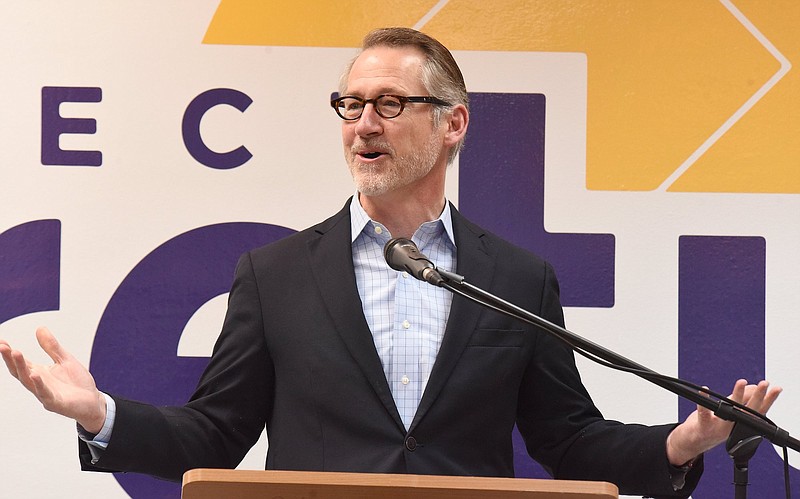NASHVILLE — Tennessee Gov. Bill Lee on Thursday signed into law a measure to slash the size of the 40-member Metro Nashville Council to 20 members, less than an hour after fellow Republicans in the Senate approved the measure sponsored by Sen. Bo Watson, R-Hixson.
The bill is widely seen as retribution for the Metro Council torpedoing the Tennessee Republican Party's effort to bring the 2024 Republican National Convention to Democratic-governed Music City. It passed on a 23-7 vote.
Earlier, Sen. Jeff Yarbro, D-Nashville, warned the new law will inject "chaos" into Metro elections this summer. It also violates three provisions of the Tennessee Constitution and will be challenged in court, Yarbro said.
The impact on Nashville will be "to upend its entire government in a matter of weeks," Yarbro, who is running for mayor, told colleagues. "That's just not a responsible way to lead."
Yarbro, an attorney, spent much of his time during debate seeking to raise legal questions he hopes courts will consider and strike down in a law he said is clearly unconstitutional under a 1953 state constitutional provision.
Watson said the legislation is constitutional.
Sen. Adam Lowe, R-Calhoun, spoke in favor of the bill.
"Conventional wisdom for the past four decades has been that smaller group sizes tend to make better decisions, and this is the largest council that we see," Lowe said. "There's a reason why we're judged by 12 of our peers in a jury, and there's a reason, I think, why Christ walked with 12 of his disciples."
Democrats liken Nashville to the golden goose that continues to lay golden eggs, saying the city's booming tourist scene and other economic activity provide some 50% of state government revenue. They expressed concerns the new law will reduce minority representation and, with more constituents per district, leave remaining council members less responsive to residents' needs.
Republicans countered that Metro Nashville has the third-largest council in the country. Democrats said nonmetro counties have multiple towns and cities and can have upwards of 70 or even 80 council members and commissioners.
Yarbro picked up a copy of the Tennessee Constitution and said it contains clear directives of what the legislature can and cannot do. Courts, he said, will need to "choose whether they're loyal to us or loyal to what's in this book."
"This feels like a hostile takeover, that's what this appears to us," Sen. Heidi Campbell, D-Nashville, said during debate on the bill.
"I know that there are some angry people," she said later, citing a battle over naming the road that runs before the state Capitol.
Metro Nashville changed the name of a portion of Charlotte Street to John Lewis Way in honor of the civil rights icon John Lewis, who cut his activist teeth in Nashville while attending college here and engaging in anti-segregation protests.
Some Republican lawmakers introduced a bill this year to rename it President Donald Trump Boulevard. The House bill was withdrawn earlier this week after the bill's primary sponsor, Rep. Paul Sherrell, R-Sparta, made comments on another bill dealing with methods of execution for prisoners given the death penalty. Sherrell, who is white, suggested adding hanging by tree to state law as a legal form of execution. That drew protests from Black lawmakers and other Democrats, who drew historical parallels to the lynching of Blacks by white mobs.
Sen. Frank Niceley, R-Strawberry Plains, offered what he called a "contrarian" view of the size of legislative bodies.
"We're not punishing this mayor at all," Niceley said. "We're rewarding the mayor. Every mayor in the nation, in the world, would rather deal with a smaller body. Fewer people to talk to. We're rewarding the lobbyists."
He joined several other Republicans in not voting on the bill.
"I think the facts of this legislation have been well laid out to the members," Watson said.
Watson closed with what he said was a quote from a current Metro Council member.
"He said, 'We live in a city that's growing at an exponential growth rate. And as a consequence, we need to become more efficient and effective in government. And large does not always mean good.'"
Contact Andy Sher at asher@timesfreepress.com.
